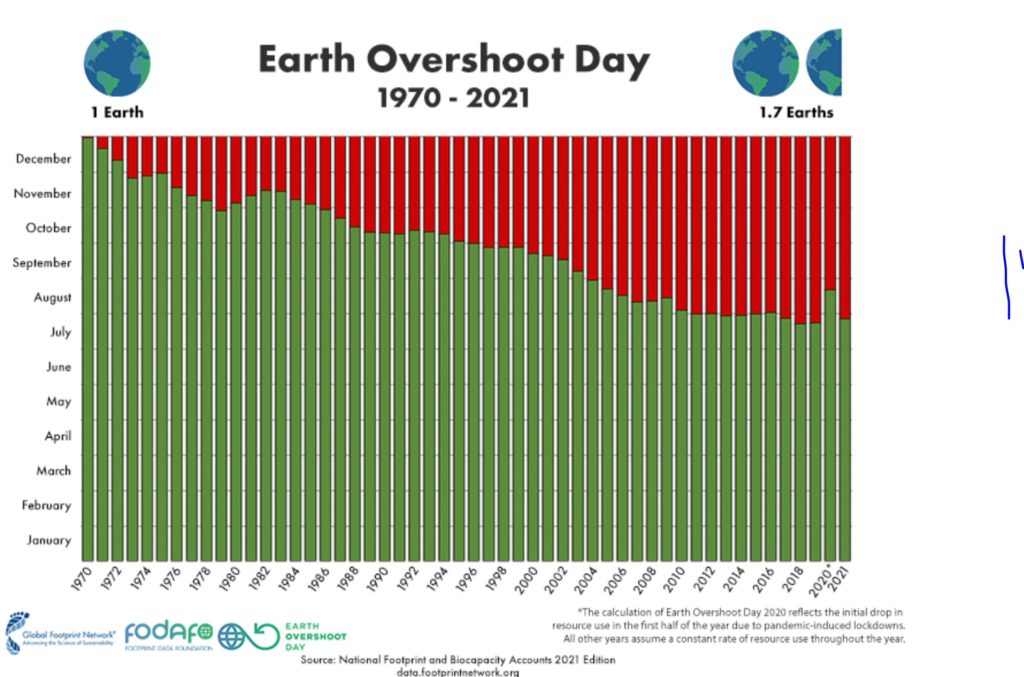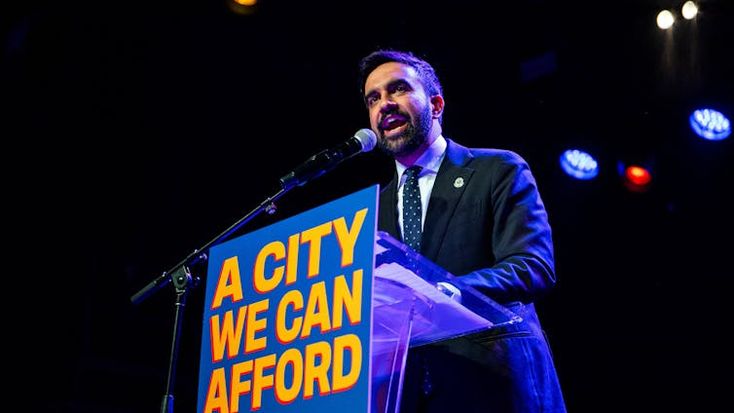
While COVID-induced lockdowns gave the world a three-week relief in 2020, even a pandemic does not stop the resource use in the world in 2021. And what is even worse most post-COVID policies that the world governments have decided upon do not seem to adequately address any of the efforts needed to bring down the growth of the world’s use of resources.
Notable drivers are the 6.6% carbon Footprint increase over last year, as well as the 0.5% decrease in global forest biocapacity due in large part to the spike in Amazon deforestation—in Brazil alone, 1.1 million hectares were lost in 2020, and estimates for 2021 indicate up to 43% year-over-year increase in deforestation.
“As the UN Decade of Ecosystems Restoration was launched on World Environment Day, June 5, this data makes abundantly clear that recovery plans in the post-COVID 19 eras can only be successful in the long-term if they embrace regeneration and ecological resource-efficiency,” said Global Footprint Network CEO Laurel Hanscom.
Each year, Earth Overshoot Day marks the date when humanity has used all the biological resources that Earth regenerates during the entire year. Humanity currently uses 74% more than what the planet’s ecosystems can regenerate—or “1.7 Earths.” From Earth Overshoot Day until the end of the year, humanity operates on ecological deficit spending. According to the National Footprint & Biocapacity Accounts (NFA) based on UN datasets, this spending is currently some of the largest since the world entered into ecological overshoot in the early 1970s.
In 2021 the carbon Footprint of transportation remains lower than pre-pandemic levels. CO2 emissions from domestic air travel and road transport are set to remain 5% below 2019 levels, while international aviation is expected to register 33% below, according to the International Energy Agency (IEA). Global energy-related CO2 emissions, on the other hand, are projected to rebound and grow by 4.8% from last year as the economic recovery ignites demand for fossil fuels. In particular, global coal use is anticipated to jump in 2021 and is estimated to contribute 40% of the total carbon Footprint this year.
Business-as-usual must be left behind
Last year, as the pandemic hit around the world, governments demonstrated they can act swiftly, both in terms of regulations and spending, when they put human lives above all else. The perfect storm that is brewing, as climate change impacts and biological resource security converge, requires the same level—or higher—of alertness and swift action from decision-makers.
“In November, as a weary world turns its attention to Scotland and COP26, together we can choose one-planet prosperity over one-planet misery. We can and must build from the pandemic–our global ability to plan, protect and move at pace. Scottish innovation helped lead the Industrial Revolution; in 2021, the Glasgow summit and the future we choose as each community, city, company or country, offers real hope for a new net-zero revolution,” said SEPA CEO Terry A’Hearn.
Through their infrastructure and regulatory powers, cities have significant opportunities to shape their resource efficiency and, with it, their future. Given their risk exposure, aligning their development plans with what resiliency requires in a world shaped by climate change and biological resource constraints, has become cities’ utmost priority regardless of international agreements.
“Cities are ideal living laboratories for social and environmental innovation, offering significant learning to create real-world solutions and transformation. And universities have an obligation to act in partnership with their host cities to accelerate progress toward a just and sustainable future,” said Professor Jaime Toney, director of the University of Glasgow’s Centre for Sustainable Solutions. “We are working with a people- and place-based approach to delivering positive change for a climate-resilient city whose legacy lasts beyond COP26.”
“Let Earth Overshoot Day be our call to arms,” stated Councillor Susan Aitken, the Leader of Glasgow City Council. “In November the eyes of the world will be on Glasgow, host of COP26, the climate summit that needs to make the decisions that will deliver our planet on a safer and more sustainable future. We’ve got the opportunity here in Glasgow to show the world what we’re doing, coalescing together as a city to show real change, to respond to the climate and ecological emergency. Let’s put our planet first and let’s #MoveTheDate together.”
Additional resources
Press release in multiple languages
How Earth Overshoot Day 2021 was calculated
How to compare the date of Earth Overshoot Day to previous years
Ecological Footprint data for more than 200 countries and regions
About the Ecological Footprint
The Ecological Footprint is the most comprehensive biological resource accounting metric available. On the basis of 15,000 data points per country per year, it adds up all of people’s competing demands for biologically productive areas – food, timber, fibers, carbon sequestration, and accommodation of infrastructure. Currently, carbon emissions from burning fossil fuel make up 60 percent of humanity’s Ecological Footprint. The National Footprint and Biocapacity Accounts are now produced by FoDaFo with York University in Toronto.
About Global Footprint Network
Global Footprint Network is an international sustainability organization that is helping the world live within the Earth’s means and respond to climate change. Since 2003 we’ve engaged with more than 50 countries, 30 cities, and 70 global partners to deliver scientific insights that have driven high-impact policy and investment decisions. Together, we’re creating a future where all of us can thrive within the limits of our one planet. www.footprintnetwork.org
About the Scottish Environment Protection Agency
SEPA is Scotland’s principal environmental regulator. Everyday SEPA works to protect and enhance Scotland’s environment, helping communities, and businesses thrive within the resources of one planet. We call this One-Planet Prosperity. We also help Scotland to prepare more powerfully for future increased flooding, as the national flood forecasting, flood warning and strategic flood risk management authority. www.sepa.org.uk
Media Contacts
Global Footprint Network
Amanda Diep
+1 (510) 839-8879 x 304 (California, USA)
amanda.diep@footprintnetwork.org
Laetitia Mailhes
+33 650 979 012 (France)
laetitia.mailhes@footprintnetwork.org
SEPA
Martin Grey
Head of Communications and Marketing
+44 (0)7557 497 947
media@sepa.org.uk




41 Comments
Pingback: Goal 12: Responsible Consumption and Production - Bergensia
Pingback: Arne Næss the founder of "deep ecology" - Bergensia
Pingback: April 12, Norway's Overshoot Day in 2022 - Bergensia
Pingback: เทคนิคบาคาร่า
Pingback: buy magic mushroom microdose capsules online Australia
Pingback: Fysio Dinxperlo
Pingback: buy magic mushrooms in california
Pingback: boutiq vapes
Pingback: เขียนโปรแกรม
Pingback: เครดิตฟรี 100
Pingback: lsm99.review
Pingback: personalized cornhole wraps with logo
Pingback: สมัคร yehyeh
Pingback: COUNTERFEIT MONEY FOR SALE
Pingback: 1ml ceramic cartridge
Pingback: Study Medicine in Nigeria
Pingback: PANDA555
Pingback: เกมสล็อตค่าย pg แตกหนัก Lsm99live
Pingback: ks quik
Pingback: 15 daagse rondreis senegal gambia
Pingback: steenslagfolie
Pingback: ร้านทำเล็บเจลใกล้ฉัน
Pingback: Otter Creek Polonium For Sale
Pingback: 온라인카지노사이트
Pingback: ตู้เชื่อม
Pingback: เรียนต่อจีน
Pingback: xxx โอลี่แฟน
Pingback: live webcams
Pingback: Diyalaa
Pingback: kc9
Pingback: nzt989
Pingback: lucky jet
Pingback: best home gym equipment for sale
Pingback: gratowin
Pingback: โป๊กเกอร์ 3 ใบ เกมไพ่ออนไลน์ ทำเงินง่าย บนเว็บ LSM99LIVE
Pingback: นัดเด็ก
Pingback: molly88
Pingback: exchange monero without kyc
Pingback: Team building กิจกรรม
Pingback: sculptra manhattan beach
Pingback: web portal